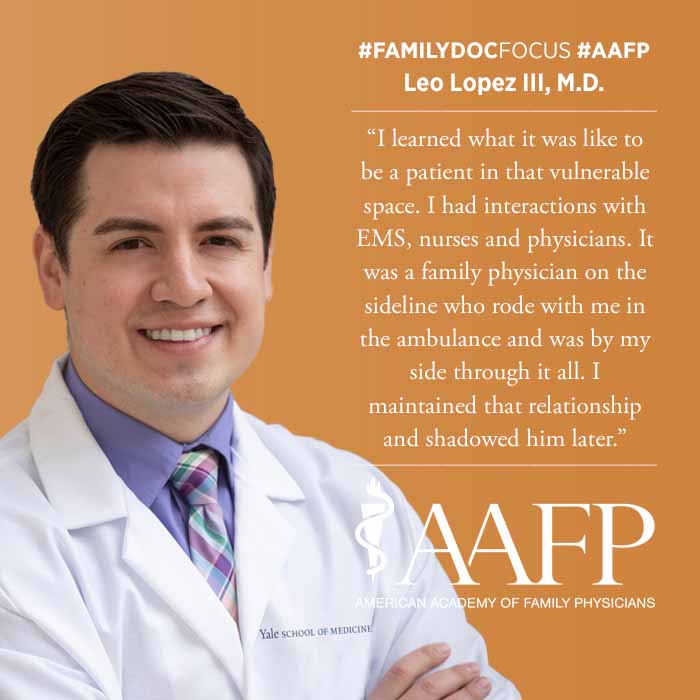Physician Filmmaker Documents More Than Patient Records
December 02, 2019 12:56 pm David Mitchell – At pivotal moments in the life of Leo Lopez III, M.D., family physicians have been there to not only provide diagnosis and treatment but also answer questions and guide the way.
Lopez was 9 when a family physician detected a lump in his mother's breast and referred her to imaging, beginning a long battle with cancer that exposed Lopez to multiple health care settings and inspired him to volunteer in public health initiatives in South Texas.
Lopez already was pondering a career in health care when he collapsed during a high school football game. The incident cemented his career path in medicine. It was a family physician, Jake Margo, M.D., who was on the sidelines caring for athletes that night.
"I learned what it was like to be a patient in that vulnerable space," said Lopez, who suffered a subdural hematoma and required emergency brain surgery. "I had interactions with EMS, nurses and physicians. It was a family physician on the sideline who rode with me in the ambulance and was by my side through it all. I maintained that relationship and shadowed him later."
Lopez's ordeal made the local news and also connected him to Mario Ramirez, M.D., a pioneer of family medicine in the Rio Grande Valley.

"Someone mentioned to Dr. Ramirez that I had interest in medicine, and he organized meetings with me while I was in the hospital and after I went home," Lopez said. "He talked to me about caring for human beings as a whole. He had all these rich stories about bringing people into the world and caring for them for their entire lives and going on home visits and being welcomed by the whole family. I knew I wanted to be part of that world."
Lopez, a graduate of the University of Texas School of Medicine at San Antonio and the Christus Santa Rosa Family Medicine Residency Program, is completing his training in the Yale School of Medicine's National Clinician Scholars Program in New Haven, Conn. He is conducting research in the fellowship program related to Medicaid programs, nonprofit hospitals and literacy programs, and he expects to complete a master's degree in health science in June.
He also sees patients and teaches medical students at the Yale New Haven Hospital Primary Care Center, sees patients and teaches residents at the Fair Haven Community Health Center and evaluates patients at the Yale Center for Asylum Medicine.
Lopez already has a job lined up when his fellowship ends. He has worked as a health policy analyst for New York City Health and Hospitals since last summer and will assume the role of director of health equity in the city's public safety net system.
Lopez plans to continue his research and see patients in his new role. Although research often leads to literature publication, Lopez has some other ideas for his findings. He already has produced a couple of documentaries. Texas UnMedicaided, which he made during residency, looked at his native state's decision not to expand Medicaid under the Patient Protection and Affordable Care Act. The film has been screened for physician conferences, advocacy groups and on college campuses with the intent of "building coalitions and having conversation about what Medicaid expansion could mean for Texas."
Another film, Image of the Enemy, was shot in Israel and examined perceptions among groups in conflict.
"I had four years of media training in high school," said Lopez, who produced and directed both films. "I've continued to build my skills in the field. I've always been fascinated by storytelling and its potential to impact policy. It's integral to the work I'm doing now."
Now Lopez is directing an as-yet-untitled documentary series that will look at the intersection of social justice and the social determinants of health, examining issues such as how physicians respond to family separations at the U.S. border. He hopes to release it next spring despite a loaded schedule.
"I carve out time for it," he said. "It's a type of qualitative research and dissemination."